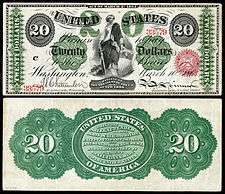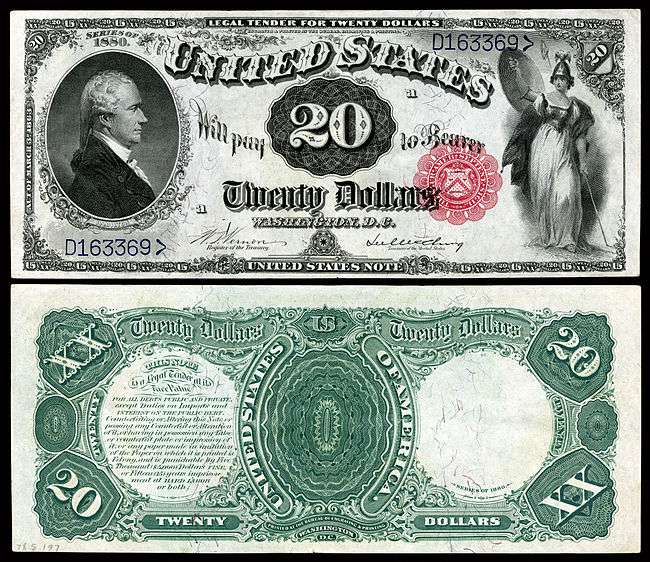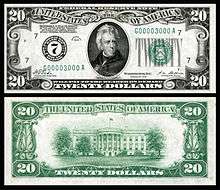United States twenty-dollar bill
| (United States) | |
|---|---|
| Value | $20 |
| Width | 156 mm |
| Height | 66.3 mm |
| Weight | Approx 1 g |
| Paper type |
75% cotton 25% linen |
| Years of printing | 1861–present |
| Obverse | |
 | |
| Design | Andrew Jackson |
| Design date | 2003 |
| Reverse | |
 | |
| Design | White House |
| Design date | 2003 |
The United States twenty-dollar bill ($20) is a denomination of U.S. currency. The seventh U.S. President (1829–37), Andrew Jackson has been featured on the front side of the bill since 1928, while the White House is featured on the reverse side. On April 20, 2016, it was announced that a new design, expected to be unveiled in 2020 (the 100th anniversary of the 19th Amendment), will have a portrait of Harriet Tubman on the front, with Jackson appearing on the reverse with The White House.[1][2]
As of December 2013, the average circulation life of a $20 bill is 7.9 years before it is replaced due to wear.[3] Approximately 11% of all notes printed in 2009 were $20 bills.[4] Twenty-dollar bills are delivered by Federal Reserve Banks in violet straps.
Pre-Federal Reserve history



- 1861: A demand note with Lady Liberty holding a sword and shield on the front, and an abstract design on the back. The back is printed green.
- 1862: A note that is very similar, the first $20 United States note. The back is different, with several small variations extant.
- 1863: A gold certificate $20 note with an Eagle vignette on the face. The reverse has a $20 gold coin and various abstract elements. The back is orange.
- 1865: A national bank note with "The Battle of Lexington" and of "Pocahontas" in black, and a green border.
- 1869: A new United States note design with Alexander Hamilton on the left side of the front and Victory holding a shield and sword. The back design is green.
- 1875: As above, except with a different reverse.
- 1878: A silver certificate $20 note with a portrait of Stephen Decatur on the right side of the face. The back design is black.
- 1882: A new gold certificate with a portrait of James Garfield on the right of the face. The back is orange and features an eagle.
- 1882: A new national bank note. The front is similar, but the back is different and printed in brown.
- 1886: A new silver certificate $20 note with Daniel Manning on the center of the face.
- 1890: A treasury (coin) note with John Marshall on the left of the face. Two different backs exist: both with abstract designs.
- 1902: A new national bank note. The front design features Hugh McCulloch, and the back has a vignette of an allegorical America.
- 1905: A new gold certificate $20 note with George Washington on the center of the face. The back design is orange.
Federal Reserve history






Andrew Jackson first appeared on the $20 bill in 1928. Although 1928 coincides with the 100th anniversary of Jackson's election as president, it is not clear why the portrait on the bill was switched from Grover Cleveland to Jackson. (Cleveland's portrait was moved to the new $1000 bill the same year). According to the U.S. Treasury, "Treasury Department records do not reveal the reason that portraits of these particular statesmen were chosen in preference to those of other persons of equal importance and prominence."[5]
The placement of Jackson on the $20 bill may be a historical irony; as president, he vehemently opposed both the National Bank and paper money and made the goal of his administration the destruction of the National Bank.[6][7] In his farewell address to the nation, he cautioned the public about paper money.[8]
- 1914: Began as a large-sized note, a portrait of Grover Cleveland on the face, and, on the back, a steam locomotive and an automobile approaching from the left, and a steamship approaching from the right.
- 1918: A federal reserve bank note with Grover Cleveland on the front, and a back design similar to the 1914 Federal Reserve Note.
- 1928: Switched to a small-sized note with a portrait of Andrew Jackson on the face and the south view of the White House on the reverse. The banknote is redeemable in gold or silver (at the bearer's discretion) at any Federal Reserve Bank.
- 1933: With the U.S. having abandoned the gold standard, the bill is no longer redeemable in gold, but rather in "lawful money", meaning silver.
- 1942: A special emergency series, with brown serial numbers and "HAWAII" overprinted on both the front and the back, is issued. These notes are designed to circulate on the islands, and be deemed invalid in the event of a Japanese invasion.
- 1948: The White House picture was updated to reflect renovations to the building itself, including the addition of the Truman Balcony, as well as the passage of time. Most notably, the trees are larger.
- 1950: Design elements like the serial numbers are reduced in size and moved around subtly, presumably for aesthetic reasons.
- 1963: "Will Pay To The Bearer On Demand" is removed from the front of the bill below the portrait, and the legal tender designation is shortened to "This note is legal tender for all debts, public and private" (eliminating "and is redeemable in lawful money at the United States Treasury, or at any Federal Reserve Bank.") Also, "In God We Trust" is added above the White House on the reverse. These two acts (one taking U.S. currency off silver backing, and the other authorizing the national motto) are coincidental, even if their combined result is implemented in one redesign. Also, several design elements are rearranged, less perceptibly than the change in 1950, mostly to make room for the slightly rearranged obligations.
- 1969: The new treasury seal appears on all denominations, including the $20.
- 1977: A new type of serial-number press results in a slightly different font. The old presses are gradually retired, and old-style serial numbers appear as late as 1981 for this denomination.
- 1992: Anti-counterfeiting features are added: microprinting around the portrait, and a plastic strip embedded in the paper. Even though the bills read Series 1990, the first bills were printed in April 1992.[9]
- September 24, 1998: Received a completely new appearance to further deter counterfeiting; the picture of the White House was changed to the north side view. A larger, off-center portrait of Jackson was used on front, and several anti-counterfeiting features were added, including color-shifting ink, microprinting, and a watermark. The plastic strip now reads "USA 20" and glows green under a black light.[10] The bills were first printed in June 1998.[11]
- October 9, 2003:[12] The current series of 20 dollar bills is released with light background shading in green and yellow, and no oval around Andrew Jackson's portrait (background images of eagles, etc. were also added to the front); the back is the same view of the White House, but without the oval around it. Ninety faint "20"s are scattered on the back in yellow as a "EURion constellation" to prevent photocopying. The first issue's series date is 2004 with Marin-Snow signatures. The bills were first printed in April 2003.[13]
Proposal for a woman's portrait
In a campaign called "Women on 20s", selected voters were asked to choose 3 of 15 female candidates to have a portrait on the $20 bill. The goal was to have a woman on the $20 bill by 2020, the centennial of the 19th Amendment which gave women the right to vote.[14] Among the candidates on the petition were Harriet Tubman, Eleanor Roosevelt, Rosa Parks, and Wilma Mankiller, the first female chief of the Cherokee Nation.[15][16][17]
On May 12, 2015, Tubman was announced as the winning candidate of that "grassroots" poll with more than 600,000 people surveyed and more than 118,000 choosing Tubman, followed by Roosevelt, Parks and Mankiller.[18]
On June 17, 2015, Treasury Secretary Jack Lew announced that a woman's portrait would be featured on a redesigned $10 bill by 2020, replacing Alexander Hamilton.[19] However, that decision was reversed, at least in part due to Hamilton's surging popularity following the hit Broadway musical Hamilton.[20]
On April 20, 2016, Lew officially announced that Alexander Hamilton would remain on the $10 bill, while Andrew Jackson would be replaced by Tubman on the front of the $20 bill, with Jackson appearing on the reverse.[1][21] Lew simultaneously announced that the five- and ten-dollar bills would also be redesigned in the coming years and put into production in the next decade.[1][22]
See also
- Twenty Bucks, a 1993 movie that follows the travels of a $20 bill
References
- 1 2 3 "Treasury Secretary Lew Announces Front of New $20 to Feature Harriet Tubman, Lays Out Plans for New $20, $10 and $5" (Press release). United States Department of the Treasury. April 20, 2016. Retrieved April 27, 2016.
- ↑ Timiraos, Nick (April 20, 2016). "Harriet Tubman to Be Added to $20 Bill". WSJ.
- ↑ "How long is the life span of U.S. paper money?". Federal Reserve. Retrieved April 16, 2015.
- ↑ "Money Facts". Bureau of Engraving and Printing.
- ↑ "U.S. Currency FAQs". U.S. Bureau of Engraving and Printing. Archived from the original on May 5, 2015. Retrieved 13 May 2015.
- ↑ "Jackson as President". CliffsNotes. Retrieved November 20, 2007.
- ↑ "Jackson Vetoes Bank Bill — July 10, 1832". Miller Center of Public Affairs, University of Virginia. Retrieved November 20, 2007.
- ↑ Wikisource:Andrew Jackson's Farewell Address
- ↑ "USPaperMoney.Info: Series 1990 $20".
- ↑ "New $20 Bill Debuts September 24th - 09/21/98".
- ↑ "USPaperMoney.Info: Series 1996 $20".
- ↑ "Anti-Counterfeiting". Bureau of Engraving and Printing. United States Treasury. 2007. Retrieved May 13, 2015.
- ↑ "USPaperMoney.Info: Series 2004 $20".
- ↑ "Why the $20?". Women On 20s. Retrieved May 13, 2015.
- ↑ Tan, Avianne (April 8, 2015). "'Women on 20s' to Ask President Obama to Put One of These 4 Women on $20 Bill". ABC News. Retrieved April 9, 2015.
- ↑ Which country has the least sexist banknotes? BBC. April 13, 2015. Retrieved on April 14, 2015.
- ↑ "Final Round Candidates". Women On 20s. Retrieved May 13, 2015.
- ↑ "Harriet Tubman wins poll to replace Andrew Jackson on $20 bill". New York Post. Reuters. May 13, 2015. Retrieved July 27, 2015.
- ↑ "Andrew Jackson To Be Taken Off The $20 Bill". Huffington Post. April 17, 2016. Retrieved April 19, 2016.
- ↑ Nguyen, Tina. ""Hamilton" Fans, Rejoice: Founding Father to Stay on the $10 Bill". Vanity Fair.
- ↑ White, Ben; McCaskill, Nolan D. "Treasury's Lew to announce Hamilton to stay on $10 bill". Politico. Retrieved April 20, 2016.
- ↑ Korte, Gregory (April 21, 2016). "Anti-slavery activist Harriet Tubman to replace Jackson on the front of the $20 bill". USA Today. Retrieved April 27, 2016.
External links
| Wikimedia Commons has media related to 20 United States dollar banknotes. |